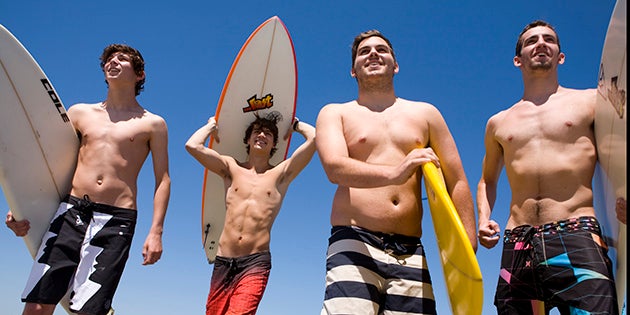It’s officially spring in South Carolina. And the latter part of the spring semester is when students at the College begin signing up for their fall courses. Each year, a number of course offerings stand out on the schedule due to the unique nature of their subject matter. From art history to zoology, students have some truly engaging choices. Here’s a quick look at some of the more unusual courses being taught next fall.

Gary Shteyngart, one of several authors that students enrolled in “Jews, Race and American Comic Fiction” will be reading in the fall semester of 2016.
Jews, Race and American Comic Fiction – This 300-level offering in the Jewish Studies Program explores the hypothesis that American comedy is the expression of anxieties about cultural superiority and inferiority, typically played out in discussions of race. Philosophy professor Larry Krasnoff and his students will explore how Jewish-American and African-American writers – and white, non-Jewish American authors – write about African-Americans and Jews. The readings will include work from Mark Twain, George Schuyler, John Kennedy Toole, Philip Roth, Ismael Reed, Gary Shteyngart and others.
Economic Theory, Social Justice and Public Policy – One of the main goals of economic theory is to explain how societies create and distribute income and wealth. To understand this, students in this class will read classical economists such as Adam Smith and Karl Marx, but they’ll also read the work of contemporary thinkers such as David Schmidtz and Peter Singer. According to economics professor Daniela Goya-Tocchetto, the class will explore and discuss important economic issues such as the origin and justification of private property and the economic and ethical implications of the welfare state.
World Music Cultures – This course will examine both the sounds and their specific cultural meanings from the perspective of ethnomusicology. Students will explore cross-cultural commonalities and differences in the ways that music creates and reflects culture, drawing case studies from Africa, Asia, Europe and the Americas. Topics discussed will include music’s relationship to ritual, migration, globalization, politics, identity, technology and memory.
American Automotive History and Documentation – Taught for the first time at the College, this course will examine historically significant automobiles. Students in the class will travel to Rock Hill, S.C., to document the history of an Anderson Six, a remarkably upscale competitor to Ford’s Model T. They will also have the opportunity to present their work at an international conference on preserving automotive heritage. The instructor, historic preservation professor Barry Stiefel, says “This is definitely a new direction. There are 70 colleges across the country that have historic preservation programs, but not one of them offers a course on the preservation or history of automobiles.”
From Russia with Code: Cybersecurity and Russia – This course, part of the First Year Experience Program at the College, will combine basic computer science and Russian 101. Students will be engaged in a study of Russian cybercrime, one of the most dangerous threats to computer security systems in the U.S. Ultimately, they’ll acquire expertise on a topic that is a huge job driver in the cybersecurity market.
Beginning Surfing – Students in this course will meet twice a week as they learn to surf and earn college credit at the same time. But they’ll learn much more than how to shred waves. Kai Dilling ’93, the instructor, takes a holistic approach to this topic, teaching the students about wave dynamics, ocean stewardship, surfboard technology and human kinesthetics.
Charleston and the Civil Rights Movement – This course – one of the many First Year Experience courses offered – focuses on significant, local historical sites and events such as the Stono Rebellion of 1739, Denmark Vesey’s plotted rebellion in 1822, and the Hospital Workers’ Strike of 1969. Students will study the history of this city through intensive reading and historic site visits as they begin to examine how popular narratives about Charleston have been constructed and various issues, such as segregation and exploitation, have been ignored.
The Spirit of Sustainability – This course examines sustainability from the context of religious ethics and spiritual activism. Working with religious studies professor Todd LeVasseur’97, who also directs the College’s program in environmental studies, students will explore the current ecocrisis, its sources, and its various social and environmental impacts. They will also analyze the responses from various religious institutions and spiritual leaders. Class sessions will include a mix of lectures, videos and group discussions, with possible field trips and guest lectures from local sustainability activists.
UNESCO World Heritage Sites – A senior capstone course in the Department of Hispanic Studies, this class – which is taught in Spanish – will require that students examine how World Heritage Sites (there are 150 in the Spanish-speaking world) offer a unique map of our planet. According to Hispanic studies professor Joseph Weyers, the students will explore a cross-section of those sites, along with intangibles such as music and cuisine, with the objective of developing an appreciation for the contributions of the peoples in the Americas and Spain to our human heritage.
For additional information, or a list of all courses offered next fall, the College’s undergraduate catalog is archived online.





